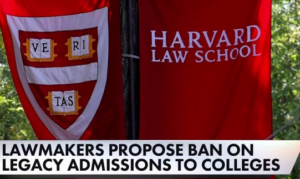Photos: YouTube
A recent NPR headline (7/24/23) declared: “Affirmative Action for Rich Kids: It’s More Than Just Legacy Admissions.” The accompanying story explained: “Affirmative action for minority kids may now be dead. But a blockbuster new study, released today, finds that, effectively, affirmative action for rich kids is alive and well.”

Likewise, a Vox headline (7/25/23) reported that “Affirmative Action for White College Applicants Is Still Here.” A Daily podcast (7/27/23) from the New York Times is headlined “Affirmative Action for the 1 Percent,” explaining “just how much elite colleges admissions in the US systematically favor the rich and the superrich.” New York magazine’s Eric Levitz (7/25/23) wrote about “Why Elite Colleges Do Affirmative Action for the Rich.”
These articles helpfully expose the hypocrisy of an educational system that continues to favor the wealthy and privileged—and of a Supreme Court that feels the need to bar attempts to remedy this situation. But these headlines’ play on “affirmative action” reflects the right wing’s use of the term to mean “unfair advantage”; they only work if the term signifies an arbitrary, unjustified preference.
What affirmative action actually is, the way it’s been used for over 60 years now, is a proactive response to structural discrimination, particularly the persistence of racism in education. Is that what legacy admissions are? No, they’re the opposite of that. Then how are they “affirmative action for the rich”?
This trope only makes sense if you’re actually against affirmative action, and against legacy admissions, too—like John McWhorter, who wrote the New York Times op-ed “End Affirmative Action for Rich White Students, Too” (2/1/23). He’s comparing a thing he doesn’t like to another thing he doesn’t like, so that works.
But you can’t defend the fairness of affirmative action by using it as a label for something that’s obviously unfair.

Source: FAIR\Research assistance: Lara-Nour Walton






